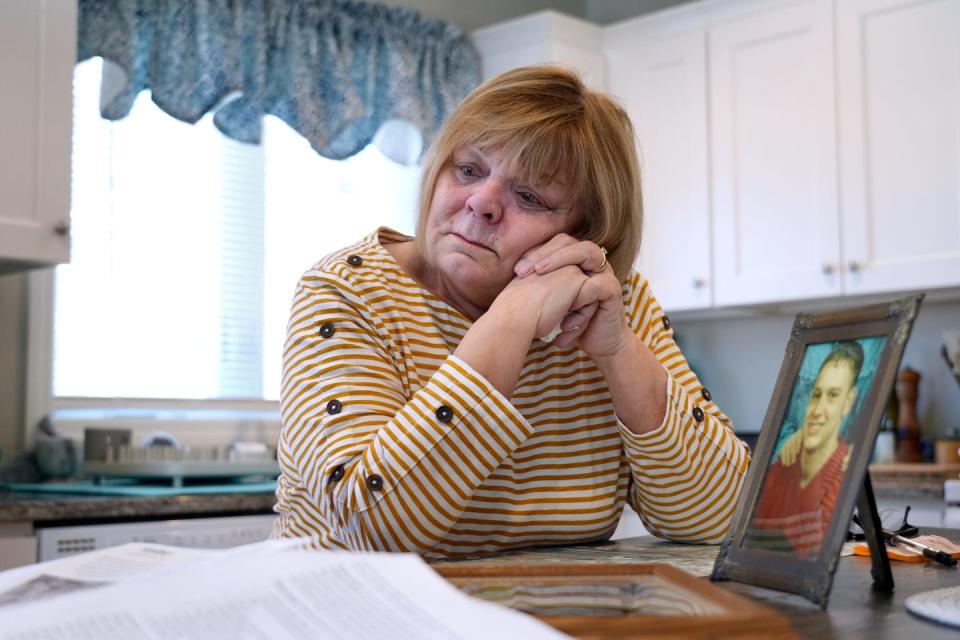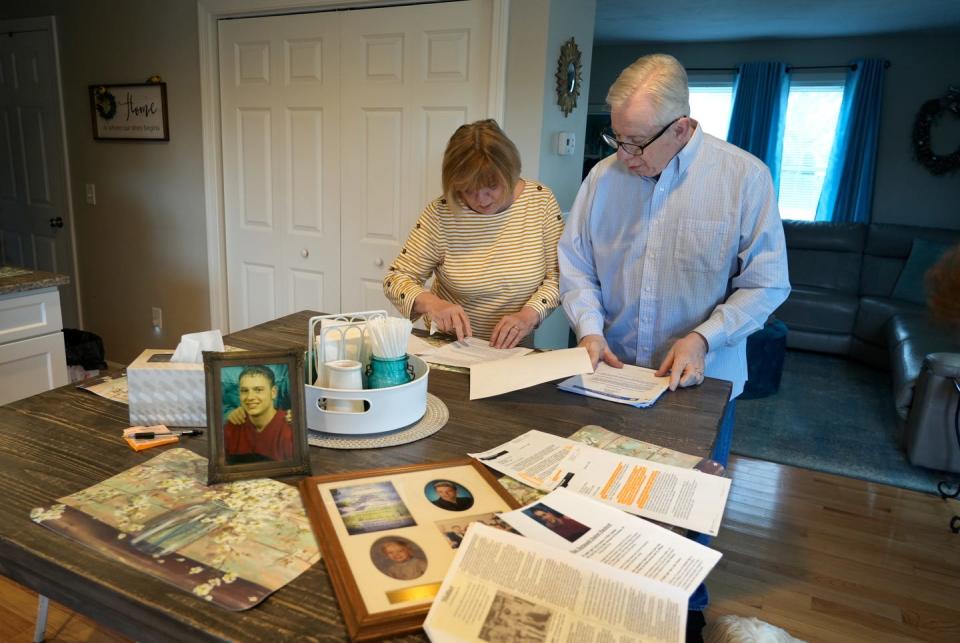Her son's killer is to be released from prison. Now she is forced to grieve anew
TAUNTON, Mass. — Joanne Bishop received an automated message last week that jolted her back to despair, a place she lands in all too easily despite the passage of 23 years.
The computerized message from the Adult Correctional Institutions alerted her to a change in the status of her son’s killer, Joao Neves.
Bishop began a frantic quest for information. She learned there would be a hearing in the coming days; she isn’t sure exactly when.
Latest from the courts: Release of 3 men convicted of murder as teens will proceed on orders of RI judge
She saw that Superior Court Judge Stephen Nugent earlier that day had ordered the release of Neves and two other men, convicted of murder in their youth, under a law passed last year. Called the Youthful Offenders Act, it gives people serving long sentences for crimes they committed before they turned 22 a chance to seek parole after they've served 20 years.

“I was never notified. I think the families should have been notified,” Bishop, 68, said through tears in a phone conversation last Friday. “My son can’t come back. He’s never coming back.”
More: College student from Hyannis killed in Providence robbery
More: Earlier parole sought for crimes done before age 18
A robbery attempt turns to murder
The arrest of Neves, then 16, and his accomplice, 18-year-old Eliecer Ortiz, in John Cumiskey’s murder on Jan. 15, 1999, transfixed Providence.
The city had been terrorized by a string of armed robberies on the East Side. Victims told of two teenagers accosting them, demanding their money and flashing a gun if anyone hesitated. One woman reported turning over her pocketbook with $5 only to be threatened at gunpoint to hand over more. She gave up her coat.
More: Relief sought for young offenders
RI ACLU:: Youthful offenders are being illegally imprisoned past release date
It was against that backdrop that Cumiskey, a student at the University of Massachusetts Dartmouth, had gone with friends to a dance party at Lupo’s Heartbreak Hotel on a snowy night.
Cumiskey, called Cuff by loved ones, and friends headed down Union Street in search of pizza afterward. Cumiskey walked a few paces behind two friends when two teenagers confronted them and demanded money. When one of the teenagers pointed a gun, Cumiskey lunged forward to protect his friends. Neves fired two shots during the struggle, hitting Cumiskey in the head and the chest.
Neves and Ortiz were implicated in Cumiskey’s murder and in the spate of robberies. Neves, who was prosecuted as an adult, admitted to the crimes and was sentenced to life in prison plus a consecutive 10 years. Ortiz pleaded guilty to his role and received a life sentence.
A push to change the law
For years, Neves had been part of a push to give people who committed crimes in their youth a chance to prove after 20 years that they were rehabilitated and possibly get a reprieve from their sentence. Enacted last year, the measure is known colloquially as Mario’s Law, named for Mario Monteiro, who as a teen fatally shot a Cambodian immigrant.
“I know I destroyed lives,” Neves told state legislators at a hearing on the bill in 2019. He had changed, he said.
The Parole Board in August 2019 granted Neves's release effective August 2021 “to his next consecutive sentence” based on his positive prison record and the belief that he was not beyond redemption and rehabilitation despite the severity of his crimes, meeting minutes show. Neves was free to begin serving his consecutive 10-year sentence, the board said.
That’s when the state affiliate of the American Civil Liberties Union stepped in, arguing for the three men that the Parole Board and the state Department of Corrections were misreading the new law. The group accused the state of holding Neves and two other men illegally beyond their release date.
The ACLU challenged the state’s stance that the men were not eligible for release after serving 20 years for murder, but that they instead must begin serving consecutive terms meted out at their sentencings for lesser crimes.
The law specifies that “[a]ny person sentenced for any offense committed prior to his or her twenty-second birthday, other than a person serving life without parole, shall be eligible for parole review and a parole permit may be issued after the person has served no fewer than twenty (20) years' imprisonment.”
Judge Nugent last week sided with the ACLU after hearing arguments, concluding that the men were being unlawfully incarcerated and that their sentences, including consecutive terms, should be aggregated. Nugent ordered the immediate release of Neves, now 39, and two others.
“We applaud Judge Nugent for a very comprehensive and thoughtful decision today. We are relieved to have our clients’ liberty restored. On behalf of the many other similarly situated individuals being held at the ACI based on the DOC’s flawed legal interpretation of the parole statutes, we urge the state to revisit the manner of parole eligibility calculation in light of the judge’s ruling,” Lisa Hollet, former chairwoman of the Parole Board, said in a statement. Holley represented the men with ACLU cooperating lawyers Lynette Labinger and Sonja Deyoe.
'Kids make mistakes'
Rep. Julie A. Casimiro, who sponsored the legislation, praised Nugent's ruling and expressed gratitude at the men's release.
"Kids make mistakes, sometimes truly awful mistakes, but we have to realize they were still committed by children, children without fully developed brains and the necessary biological and social development to realize the significant impacts and consequences of their crimes," Casimiro, D-North Kingstown, said in a statement. "If we truly believe in our judicial system of rehabilitation, the children who committed crimes and finished growing up inside a jail cell deserve a shot at freedom if they realize the error and pain caused by their previous actions and can prove that they have fundamentally changed."
The state this week asked the state Supreme Court to review Nugent’s ruling, arguing that the judge erroneously interpreted and applied the law. It is seeking to stay the men’s release.
Blake Collins, spokesman for Attorney General Peter F. Neronha’s office, emphasized that the Parole Board had already decided to parole the men from their life sentences to their consecutive sentences in all three of the cases.
“The issue of whether youthful offenders should be eligible for parole after serving twenty years of a life sentence (as opposed to adult offenders who would be eligible for review after twenty-five years for offenses committed after 2015), regardless of whether they were also sentenced to consecutive sentences, is an important question that will impact a large number of cases,” Collins said in an email.
According to the state Department of Corrections, 67 people are potentially affected by Nugent’s ruling, only 13 of whom have already served at least 20 years and are eligible for parole review.
“It is important not only to the state — this office, the court imposing a sentence, the Department of Corrections and the Parole Board — but to defendants, the public at large, and perhaps most importantly to the victims’ families, who all deserve to understand what these sentences really mean. For this reason, we believe it is important for the Supreme Court to review these decisions and provide much needed clarification regarding how the law is to be applied,” Collins continued.
Labinger rejected the state's arguments Wednesday as an affront to the General Assembly's passage of the law. The state's reading that the law applies to people convicted of a single charge would render it meaningless to virtually every offender serving a lengthy sentence, she said.
"The state's position now is a complete nullification of the actions of the General Assembly," Labinger said, adding "My heart goes out to the families, but the state has interfered with the operation of the statute."
She emphasized, too, that the state alerts families to all Parole Board hearings, where they are provided a chance to weigh in.
"This is not a get-out-of-jail-free card. They have the extraordinarily high burden of proving they are not the same person [who committed the crimes years ago]," Labinger said. "They don't just walk out."
Ortiz, 40, who was convicted of second-degree murder, was granted parole in December based on his full acceptance of responsibility and genuine remorse, meeting minutes show. He was released March 2 and is being monitored by GPS.
Renewed suffering for victim's mother
Joanne Bishop and her husband, Ray, hope to weigh in at Neves’s future hearing, if there is one. Cuff’s death left the family fractured in how to manage and express their grief. His older brother, Jim, takes a stoic approach, while Joanne mourns and expresses outrage more openly.
“None of us can get over this,” Bishop said in the spotless kitchen in her Taunton home. “I didn’t think I was going to say anything. I just got madder and madder.”

She is not skilled with computers and didn’t follow the progress of the Youthful Offenders’ Law through the General Assembly. She became incensed at testimony showing compassion for people she views as killers, with short shrift paid to victims.
“I’m angry,” she says.
“This kid is still young enough to have children, hit the lottery. He belonged there.”
Bishop is particularly raw due to family hardships. She lost her brother to COVID. Her husband suffered a heart attack two weeks ago. She worries that her young, adopted son’s recent seizure was due to the stress he sees her under.
“I need John today, and he’s not here,” Bishop says. “I want Cuff home.”
She always knew the men who killed her son would be released eventually, but not before the conclusion of their sentences, she says. She wants to know what Neves and Ortiz look like so she doesn’t encounter them unwittingly.
“I think victims should be notified. Not just for me, but for all the victims out there,” she says.
This article originally appeared on The Providence Journal: Mother of murder victim John Cumiskey angry as judge orders killer released

